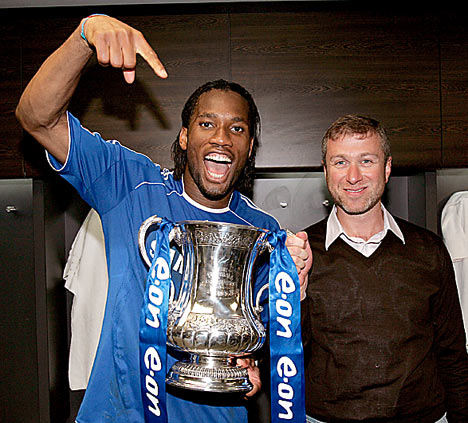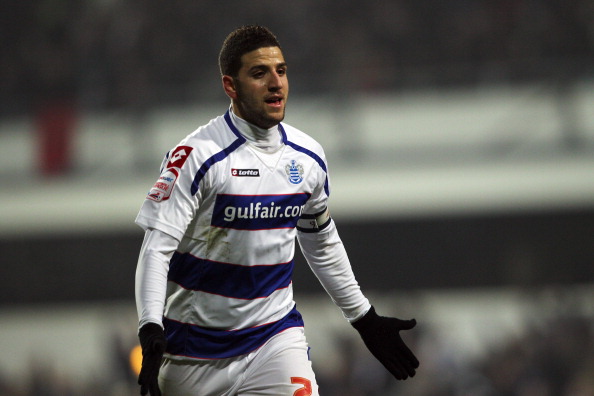The £225 million ($363 million) spend in the January transfer window has been greeted with awe, alarm and the sort of reaction that suggests something entirely new has happened.
That is not so.
Yes, the figure is a record. But that fact, by itself, does not change the basic realities of the Premier League.
Ignore the numbers for the moment and the Premier League is where it has been since the summer of 2003. Then, an unknown Russian called Roman Abramovich, flew to London, bought a West London club that had a great need for money, and changed the football landscape of this country.
Much was made as the transfer window closed as to how Liverpool had spent £35 million ($56 million) on Andy Carroll. Now, whether this Newcastle striker, who has had half a season in the Premiership, is worth that much money is not strictly relevant. The fact is that Liverpool’s new American owners, who have shown they are careful in spending money, could only afford Carroll because the Russian bankrolled them with £50 million ($80 million) for Fernando Torres. If Chelsea had not given them the cash there is no way Liverpool would have paid that much for the Newcastle player.
In a sense, in this transfer window Abramovich has done what he has been doing ever since he arrived. With his cash he is not only dictating the transfer policies of his club, but that of the entire League. One man so changes the market that it looks as if the market has changed when it has not.
 Back in 2003, the Russian had the same impact. Then, soon after his arrival, he started buying players. What is more, he paid the entire transfer price upfront, cash on the nail, as it were. This was unheard of in British football where transfer payments have always been staggered. Abramovich’s policy meant clubs with cash flow problems, like West Ham in those days, were hugely relieved and it made a tremendous difference.
Back in 2003, the Russian had the same impact. Then, soon after his arrival, he started buying players. What is more, he paid the entire transfer price upfront, cash on the nail, as it were. This was unheard of in British football where transfer payments have always been staggered. Abramovich’s policy meant clubs with cash flow problems, like West Ham in those days, were hugely relieved and it made a tremendous difference.
Some of this Russian money also trickled down to other clubs. So West Ham getting the cash, like Liverpool now, could use it to buy players down the food chain.
So in that sense, and in a most curious way, Chelsea revived the transfer trickle. Remember, transfer activity has always been based on the trickle theory of wealth. The clubs in the top league buy from clubs in the league below them and they, in turn, buy from the one beneath them and so on. In recent years this trickle has not worked because clubs have gone abroad, which has meant most of the money has not gone down the leagues in this country, but to overseas clubs. But Chelsea, under Abramovich, has every now and again revived the trickle. The only difference is that Chelsea’s money generally affects other clubs in the Premier League, not the Football League.
But then, the Premier League is itself three leagues rolled into one. At the top is a league of some six clubs competing for the four Champions League spots. Below them is a league which hopes to stay out of any relegation problems and, perhaps, qualify for Europe’s second competition. And then, finally, a cluster of clubs which somehow hope to stay in the Premiership.
The only other club in the Premiership which can do a Chelsea is Manchester City and it might, like Chelsea, demonstrate that money well spent can win titles and transform clubs. The rest of the Premiership just cannot compete in this League of two and has to rely on them to make their big purchases.
This does not mean there are no innovators in the other clubs. Much the most fascinating story here is that of Arsenal. The club decided some years ago that to compete with Manchester United they had to borrow heavily to build a new stadium. They did. Since then there has been much debate as to whether this means Arsenal have the money to buy. They say they have, but their manager, Arsene Wenger, does not want to buy big. He likes building young teams and moulding them.
In that sense Wenger is the 21st century Matt Busby doing at the Emirates what Busby did at Old Trafford after the Second World War. But with one difference. While Busby’s reach was the British Isles and Ireland, Wenger reaches the world.
To understand this listen to Johnny Giles, the Irish international who was one of the many youngsters drawn to Old Trafford and the Busby magic.
This is what Giles told me recently, “Matt’s first great thing was that he had the foresight to bring these young players into the club. England, Ireland, Scotland and Wales, he had the pick of the best under 15 year olds. Now, nobody else had done it before. It’s easy to copy something, so the original one’s always the best. Matt did that.
“But more than that he had the courage to put these young players in the team, hence we had the Busby Babes. But Matt was not as good on the game technically as say Jock Stein or Don Revie, but he had other qualities.
“When Matt created the Busby Babes there were loads and loads of great players in the club and it was the survival of the fittest. Jimmy Murphy had a great knowledge of the game. But Jimmy could only do so much. He couldn’t coach all these players. And we hardly saw Matt at all.
“So, it was the survival of the fittest. Matt didn’t have to do a lot of coaching to do. He had Duncan Edwards and Eddie Colman, terrific players. What Matt did have, I know this does not sound very good English, he had a bigness about him. Go out and play, he said. He gave us the freedom to express ourselves.”

Now listen to Adel Taarabt (pictured), the man who is weaving such magic at QPR these days. The former French youth international, now a Moroccan player, came to this country from France having signed for Tottenham. But that was not where he wanted to go.
As he told me, “The man who took me to Tottenham was Damien Comolli, now at Liverpool. He was at Arsenal at this time. But just as I was going to go to Arsenal he moved to Tottenham for a better job.
“He told me, ‘Come to Tottenham. We want to do like they do at Arsenal and take the best young players in the world, and you’re going to have a better chance there.’
“I believed him and I said I would move to Tottenham and it’s in London as well. This was a mistake for me because they tried to do like Arsenal, but I think it’s a different culture.
“They didn’t give a chance to the young players. The manager (the reference here is to Juande Ramos) didn’t give the time to the young players. If I had gone to Arsenal I would have had a better chance. I regret it because I’m sure if I had gone there I would have made progress with Wenger. For me, he’s the best, one of the best managers in the world and I would have had all my friends, all the French players I have known from playing for France. “
Tottenham have long since abandoned getting young players. Their success this season is more due to shrewd buying of older players, but they do not have the money like Chelsea. The result is in this transfer window they have missed out on getting a striker, something they badly need.
Yes, Wenger, in contrast to Busby, has not had consistent success – no trophies for five years. But talk to any manager and they are in awe of what the Frenchman has done and is doing.
And come the end of the season should Wenger not only land a Cup, but the Premiership, then it would prove that not all the money in the world can buy success. It would once again demonstrate that what matters is not how much you spend, but who you spend it on. Spending on a youngster may be worth much more than £50 million on a player like Torres who may be struggling to regain his greatness.
Mihir Bose is one of the world’s most astute observers on politics in sport and, particularly, football. He formerly wrote for The Sunday Times and The Daily Telegraph and until recently was the BBC’s head sports editor
.jpg)